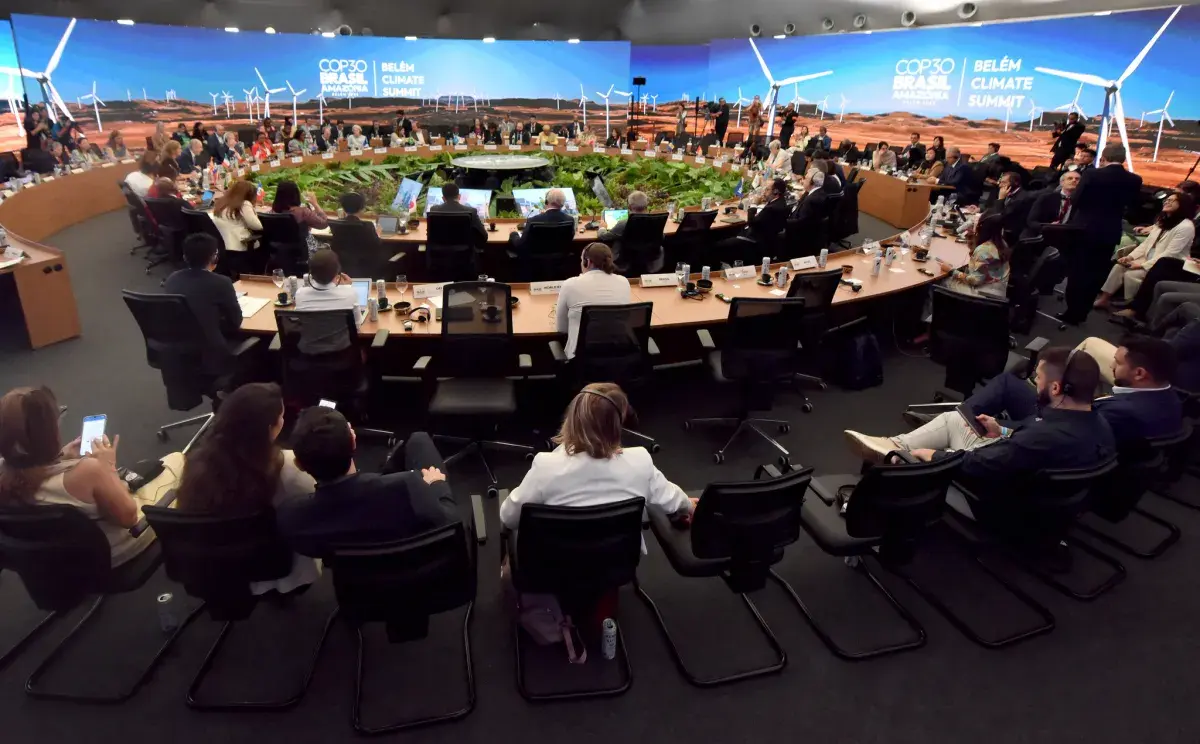Copyright Newsweek

The COP30 climate talks officially launched Monday in Belém, Brazil’s Amazon gateway city, with a warning from the top United Nations climate official to wealthy nations like the U.S. that they are not immune from the impacts of climate change. “Not one single nation among you can afford this, as climate disasters rip double-digits off GDP,” U.N. Climate Change Executive Secretary Simon Stiell said in opening remarks that focused on the climbing costs from climate-driven extreme weather and the growing opportunities in the clean energy economy. Stiell took a thinly veiled jab at President Donald Trump, who has called climate change a “con job” and is withdrawing the U.S., one of the world’s biggest carbon polluters, from the landmark Paris Climate Agreement. “Those opting out or taking baby-steps face stagnation and higher prices, while other economies surge ahead,” he said. Stiell said countries that do not act on climate will miss “the economic transformation of our age” in the global growth of clean energy technology. To remove any doubt about the target of his criticism, Stiell even quoted another U.S. Republican, President Teddy Roosevelt, who famously said that “it is not the critic who counts” but rather “those who are actually in the arena.” The COP30 delegates in the climate action arena face a daunting agenda to boost climate finance, speed the clean energy transition and strengthen protections for the world’s major forests. Brazilian President Luiz Inácio Lula da Silva challenged world leaders to deliver a “COP of truth” by taking the scientific warnings on climate change seriously. “It is time to face reality and decide whether we will have the courage and determination necessary to change,” Lula said at a leaders’ summit ahead of the climate gathering. Clean Energy Economics vs. Political Headwinds The 30th U.N. climate negotiations mark several important milestones in the movement to reduce the carbon pollution that has already pushed global temperatures to record highs. The U.N. Climate Convention has its origins in the 1992 Earth Summit in Rio de Janeiro, Lula noted, and this year also marks the 10th anniversary of the Paris Climate Agreement. In 2015 nations agreed at COP20 in Paris to cut emissions sufficiently to avoid the most dangerous warming. This year countries in the agreement are required to submit updated plans for how they will further reduce emissions. While climate scientists say there has been progress over the past decade, a U.N. Environment Programme (UNEP) analysis of the latest country pledges shows the world is still on a path to warming that is well above the upper threshold of the Paris targets. The Paris goal is to hold warming by the end of the century to no more than 2 degrees Celsius (3.6 degrees Fahrenheit) above pre-industrial levels, and to aim for an increase of no more than 1.5 degrees Celsius. The last two years were the hottest in recorded history and 2025 is on track to be the third or fourth warmest, climate scientists have warned. Global average temperatures last year briefly exceeded the 1.5-degree Celsius mark (although the Paris target is based on a longer-term average temperature). At the time of the UNEP report’s release only about a third of countries had submitted updated plans. Last week, E.U. leaders submitted their plan to cut emissions 90 percent over the coming 15 years, but the E.U. included provisions for flexibility in that target that critics said weakens the commitment. Trump, meanwhile, is not only retreating from climate goals but also pressuring other countries to abandon theirs as well. “It's hard to not feel somewhat gloomy on the political front,” the Rockefeller Foundation’s SVP and Power Program leader Ashvin Dayal told Newsweek. But political power is not the whole story of the energy transition, he said. “There's a lot more grounds for optimism, frankly, when you start examining the numbers in terms of the deployments of clean energy,” Dayal said. “Everywhere I look what I'm seeing is a massive trend towards the direction of cleaner energy systems.” Even as President Trump scraps federal support for clean energy and attempts to block wind and solar projects, nearly all the new additions to the country’s electric supply have come from renewable energy and battery storage this year, according to federal data. Companies that need power are finding that clean energy is also the cheapest and fastest way to get it. As prices drop for clean technology, more of the most rapidly growing countries adopt them to meet energy demand, Dayal said. In India, where he has done much of his work to encourage the expansion of electricity to those who need it, Dayal said the price of power from the latest solar and battery storage project easily undercuts the cost of electricity from burning coal. Pure economics provide the clean energy transition with a “tailwind we need, despite the political headwinds,” he said, although policy to support and speed along clean technology is still important. Linking Climate Change and Forest Conservation Energy isn’t the only source of greenhouse gas emissions, of course, and COP30’s Amazonian setting is designed to spotlight the important role of land use and the conservation of nature. These are the first U.N. climate talks to take place in the Amazon, and much of the negotiations this week will address mechanisms to reduce deforestation. Just ahead of COP30, several European countries, the U.K and World Bank announced the Belém Call to Action for the Congo Basin Forests, a pledge to raise more than $2.5 billion over the next five years to protect Africa’s great forest, one of the world’s three major forest basins. Brazil is launching the Tropical Forests Forever Facility (TFFF), an innovative financial mechanism to pay countries that limit deforestation with a bonus for each acre protected. Instead of depending on new pledges of donations for conservation, the TFFF will use initial investments of billions of dollars from nations and institutional investors to create a long-term investment facility that will generate payments. “It's a very interesting proposal because of the way it has been structured,” UNEP official Gabriel Labbate told Newsweek. Labbate is head of the Climate Mitigation Unit and is Global Team Leader of the UN-REDD Programme at UNEP, which is aimed at reducing emissions from deforestation and land degradation. In financial terms, Labbate said, the TFFF is akin to reinvesting capital into safe assets. “They generate a return and then this return is distributed, net of costs, to tropical forest countries,” he said. Past COPs have seen pledges to rein in deforestation but the money put into those efforts has not come close to meeting the need. If the TFFF can be capitalized at the needed level, Labbate said, then those payments, along with other funding sources could make a difference. “All of a sudden you start to put on the table incentives and money at a scale that can move the needle,” he said. Brazil’s leaders chose Belém, at the mouth of the Amazon River, as the COP30 venue to emphasize the link between the climate crisis and crises of deforestation and the loss of nature. Forests and other natural systems help to draw down and store much of the CO2 we pump into the atmosphere, and oceans can absorb some of the excess heating we cause, up to a point. Climate scientists have said that the Paris Agreement goals are not attainable without nature’s help. But soaring global heat is straining the very natural systems we need. Drought and wildfire exacerbated by climate change add to the toll that deforestation has taken in the Amazon, and the entire forest basin could be nearing a tipping point that makes its loss unstoppable. “There is no greater symbol of the environmental cause than the Amazon rainforest,” the Brazilian president said in his address to launch COP30. “Therefore, it is only fair that it is now the turn of those who inhabit the Amazon to ask what is being done by the rest of the world to avoid the collapse of their home.”



